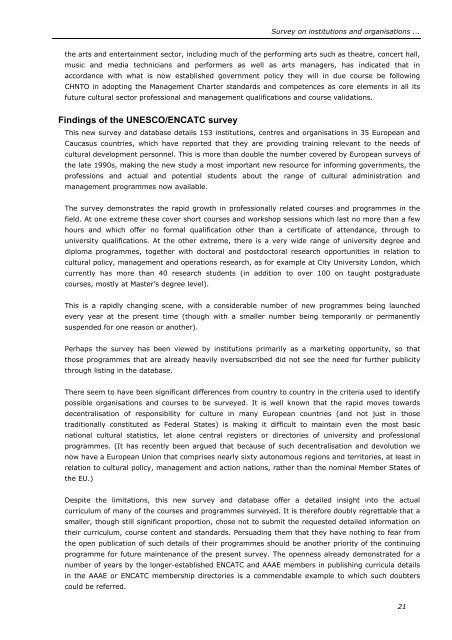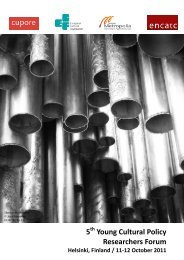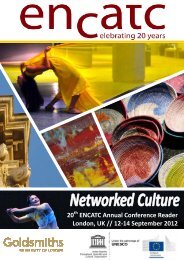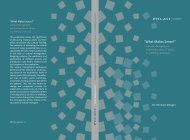Training in cultural policy and management: international ... - Encatc
Training in cultural policy and management: international ... - Encatc
Training in cultural policy and management: international ... - Encatc
Create successful ePaper yourself
Turn your PDF publications into a flip-book with our unique Google optimized e-Paper software.
Survey on <strong>in</strong>stitutions <strong>and</strong> organisations ...<br />
the arts <strong>and</strong> enterta<strong>in</strong>ment sector, <strong>in</strong>clud<strong>in</strong>g much of the perform<strong>in</strong>g arts such as theatre, concert hall,<br />
music <strong>and</strong> media technicians <strong>and</strong> performers as well as arts managers, has <strong>in</strong>dicated that <strong>in</strong><br />
accordance with what is now established government <strong>policy</strong> they will <strong>in</strong> due course be follow<strong>in</strong>g<br />
CHNTO <strong>in</strong> adopt<strong>in</strong>g the Management Charter st<strong>and</strong>ards <strong>and</strong> competences as core elements <strong>in</strong> all its<br />
future <strong>cultural</strong> sector professional <strong>and</strong> <strong>management</strong> qualifications <strong>and</strong> course validations.<br />
F<strong>in</strong>d<strong>in</strong>gs of the UNESCO/ENCATC survey<br />
This new survey <strong>and</strong> database details 153 <strong>in</strong>stitutions, centres <strong>and</strong> organisations <strong>in</strong> 35 European <strong>and</strong><br />
Caucasus countries, which have reported that they are provid<strong>in</strong>g tra<strong>in</strong><strong>in</strong>g relevant to the needs of<br />
<strong>cultural</strong> development personnel. This is more than double the number covered by European surveys of<br />
the late 1990s, mak<strong>in</strong>g the new study a most important new resource for <strong>in</strong>form<strong>in</strong>g governments, the<br />
professions <strong>and</strong> actual <strong>and</strong> potential students about the range of <strong>cultural</strong> adm<strong>in</strong>istration <strong>and</strong><br />
<strong>management</strong> programmes now available.<br />
The survey demonstrates the rapid growth <strong>in</strong> professionally related courses <strong>and</strong> programmes <strong>in</strong> the<br />
field. At one extreme these cover short courses <strong>and</strong> workshop sessions which last no more than a few<br />
hours <strong>and</strong> which offer no formal qualification other than a certificate of attendance, through to<br />
university qualifications. At the other extreme, there is a very wide range of university degree <strong>and</strong><br />
diploma programmes, together with doctoral <strong>and</strong> postdoctoral research opportunities <strong>in</strong> relation to<br />
<strong>cultural</strong> <strong>policy</strong>, <strong>management</strong> <strong>and</strong> operations research, as for example at City University London, which<br />
currently has more than 40 research students (<strong>in</strong> addition to over 100 on taught postgraduate<br />
courses, mostly at Master’s degree level).<br />
This is a rapidly chang<strong>in</strong>g scene, with a considerable number of new programmes be<strong>in</strong>g launched<br />
every year at the present time (though with a smaller number be<strong>in</strong>g temporarily or permanently<br />
suspended for one reason or another).<br />
Perhaps the survey has been viewed by <strong>in</strong>stitutions primarily as a market<strong>in</strong>g opportunity, so that<br />
those programmes that are already heavily oversubscribed did not see the need for further publicity<br />
through list<strong>in</strong>g <strong>in</strong> the database.<br />
There seem to have been significant differences from country to country <strong>in</strong> the criteria used to identify<br />
possible organisations <strong>and</strong> courses to be surveyed. It is well known that the rapid moves towards<br />
decentralisation of responsibility for culture <strong>in</strong> many European countries (<strong>and</strong> not just <strong>in</strong> those<br />
traditionally constituted as Federal States) is mak<strong>in</strong>g it difficult to ma<strong>in</strong>ta<strong>in</strong> even the most basic<br />
national <strong>cultural</strong> statistics, let alone central registers or directories of university <strong>and</strong> professional<br />
programmes. (It has recently been argued that because of such decentralisation <strong>and</strong> devolution we<br />
now have a European Union that comprises nearly sixty autonomous regions <strong>and</strong> territories, at least <strong>in</strong><br />
relation to <strong>cultural</strong> <strong>policy</strong>, <strong>management</strong> <strong>and</strong> action nations, rather than the nom<strong>in</strong>al Member States of<br />
the EU.)<br />
Despite the limitations, this new survey <strong>and</strong> database offer a detailed <strong>in</strong>sight <strong>in</strong>to the actual<br />
curriculum of many of the courses <strong>and</strong> programmes surveyed. It is therefore doubly regrettable that a<br />
smaller, though still significant proportion, chose not to submit the requested detailed <strong>in</strong>formation on<br />
their curriculum, course content <strong>and</strong> st<strong>and</strong>ards. Persuad<strong>in</strong>g them that they have noth<strong>in</strong>g to fear from<br />
the open publication of such details of their programmes should be another priority of the cont<strong>in</strong>u<strong>in</strong>g<br />
programme for future ma<strong>in</strong>tenance of the present survey. The openness already demonstrated for a<br />
number of years by the longer-established ENCATC <strong>and</strong> AAAE members <strong>in</strong> publish<strong>in</strong>g curricula details<br />
<strong>in</strong> the AAAE or ENCATC membership directories is a commendable example to which such doubters<br />
could be referred.<br />
21






